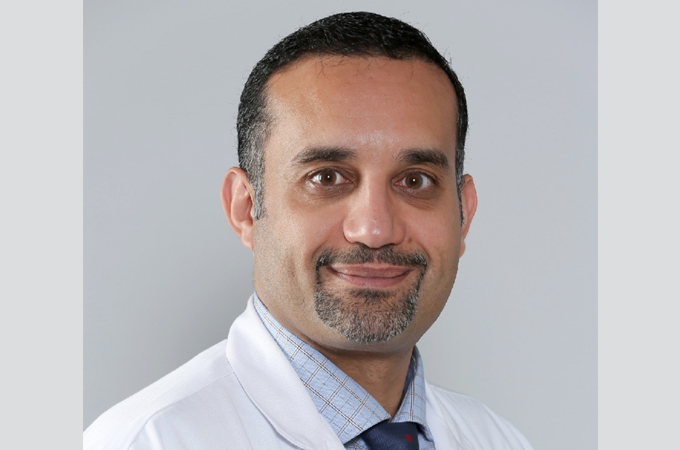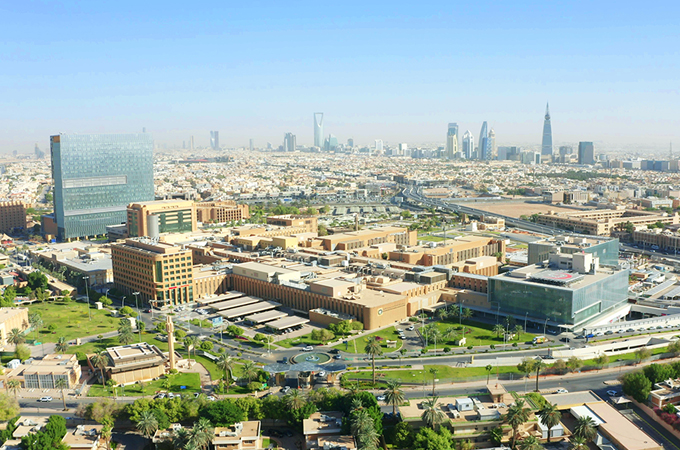Autumn 2024
KFSHRC in Riyadh recently made history by performing the world’s first fully robotic heart transplant. Team leader Dr Feras Khaliel discusses the significance of this achievement, Saudi Arabia’s leadership in medical innovation, and the potential global impact of these advancements in an exclusive interview.
King Faisal Specialist Hospital & Research Centre (KFSHRC) in Riyadh has achieved a medical breakthrough, performing the world’s first fully robotic heart transplant on a 16-year-old patient suffering from end-stage heart failure.
This groundbreaking, two-and-a-half-hour procedure was led by Dr Feras Khaliel, Head of Cardiac Surgery and Director of the Robotics and Minimally Invasive Surgery Program at KFSHRC. It marks a turning point in the evolution of heart transplant surgery, moving beyond the traditional, invasive chest-opening approach that demands lengthy recovery periods, often spanning weeks or months.
“Performing the world’s first fully robotic heart transplant was an extraordinary journey,” Dr. Khaliel shares in an exclusive interview with Arabian Knight. “This milestone is not only a triumph for KFSHRC but also a transformative moment for the global medical community.”
This achievement, along with the world’s first robotic liver transplant performed earlier at KFSHRC, solidifies Saudi Arabia’s leadership in medical innovation. “Saudi Arabia is already advancing the frontier of medical technology,” Dr. Khaliel asserts.
As a surgeon in the Kingdom, he is eager to share these breakthroughs worldwide, setting the stage for innovations that could reshape global healthcare and improve millions of lives.
Excerpts from the interview:
Your team has made history with the world’s first fully robotic cardiac surgery. Can you walk us through the experience?
The extraordinary journey began with weeks of meticulous planning involving theoretical simulations and seven full rehearsals, ensuring every team member understood their role. During the 2.5-hour procedure, the Da Vinci Surgical System’s advanced capabilities allowed us to replace the heart without opening the chest. It was a proud moment for our team to offer new hope for heart transplant patients.
What was the most challenging aspect of the procedure? What motivated you to push the boundaries of traditional surgery and explore robotic solutions?
The greatest challenge was transitioning from traditional tactile feedback to relying solely on robotic visuals and control. This change required extensive training and a different type of coordination among the team. The motivation has always stemmed from KFSHRC’s commitment to push the limits of medical innovation and offer a less invasive solution that could improve recovery and patient outcomes.
This is not the first time we have pioneered a medical treatment with robotics. KFSHRC has already performed the world’s first fully robotic liver transplant. Also, our cardiac surgery programme has performed 400 robotic-assisted procedures with 98 per cent survival rates. We invest in robotics and the latest technologies, believing in their game-changing precision and power to transform cardiac care.
Can you explain the technology that powered this fully robotic surgery? How is it different from partially robotic or assisted surgeries?
We utilised the Da Vinci Surgical System, a sophisticated platform featuring robotic arms, high-definition 3D visualisation, and advanced precision control. Unlike partially robotic or assisted surgeries, where surgeons still directly perform part of the procedure, this surgery was entirely robotic. This means the robotic system performed all the critical steps under the guidance of our team, with AI analytics assisting in real-time decision-making. Its precision and visualisation capabilities enabled minimally invasive, highly accurate incisions, significantly enhancing patient safety and surgical outcomes.
What immediate and long-term benefits do robotic surgery offer to patients, especially in cardiac procedures? Should robotic surgery become the new standard in cardiac care, or will it remain a specialised option for some instances?
In cardiac procedures, immediate benefits include significantly reduced pain, fewer complications, and shorter hospital stays. Minimally invasive procedures like robotic heart transplants eliminate the need for large incisions, meaning patients experience less physical trauma and a faster return to daily activities. The surgery performed without an open chest is vital for the young patient in this particular case. Overall, the KFSHRC robotic surgeries programme has shown a 98 per cent survival rate and over 50 per cent reduction in hospital stays, making this technology a game-changer for cardiac care. While robotic surgery will grow in use, it may remain specialised for complex procedures where precision is paramount. However, with technological advancements, we will see a broader application, potentially becoming the standard for many cardiac interventions.
Where do you see robotic cardiac surgery heading in the next decade? What advancements are you most excited about?
In the coming decade, we believe robotics will integrate even more deeply with AI for predictive analytics, enhancing real-time decision-making during surgery. Robotics will likely expand to cover even more complex cardiac procedures and may become more autonomous in assisting the surgeon.
It is exciting to see AI’s potential in predicting outcomes and recommending optimal surgical paths based on data from previous procedures, which could revolutionise how we approach high-stakes surgeries. As a surgeon in Saudi Arabia, I am excited by the potential to share these innovations worldwide, creating a ripple effect that could redefine global healthcare delivery and improve millions of lives.
How do you foresee this technology advancing healthcare in Saudi Arabia and globally?
Robotic technology is transforming the future of surgery in Saudi Arabia by enabling us to push beyond the limits of traditional procedures. We are witnessing firsthand how robotic systems are providing new hope to patients in critical conditions, minimising human error, and performing complex operations that were once deemed impossible. The recent fully robotic heart transplant – and previously the world’s first robotic liver transplant – are testaments to the Kingdom’s leadership in the field. Saudi Arabia is already advancing the frontier of medical technology.
Globally, these advancements are not just raising the bar; they are improving the quality of life for more patients through access to superior surgical outcomes and quality care. Robotics enable us to replicate world-class surgical techniques consistently, regardless of geography. This technology drives us toward a future where highly specialized procedures can be delivered more broadly, where patient recovery is faster, and where the risks associated with surgery are greatly diminished.
What role does KFSHRC play in fostering innovation in robotic surgery and other advanced medical technologies?
Being recognised as one of the world’s smartest hospitals for 2025 reflects KFSHRC’s leadership in integrating advanced technologies like AI and data-driven systems. This recognition bolsters our ability to perform complex procedures, such as robotic heart transplants, with unmatched precision and efficiency. Our Robotic Cardiac Surgery Program is one of the largest outside the United States, further solidifying our position as a global leader in healthcare innovation. This intelligent infrastructure fosters continuous advancements, enabling us to push the boundaries of robotic surgery and medical technology.
How does the hospital’s research centre collaborate with international institutions to advance medical innovations?
KFSHRC’s Research Centre collaborates with prominent international medical institutions to maintain its leadership in medical innovation. Through partnerships with leading local and global institutions, we conduct joint studies, exchange expertise, and develop cutting-edge medical technologies. We have ongoing collaborations with international institutions such as the International Society of Heart and Lung Transplantation (ISHLT), ensuring our patients’ highest level of care. These collaborations ensure that KFSHRC remains at the forefront of medical advancements, driving the future of healthcare through global shared innovation. This helps us stay at the forefront of medical research, allowing us to exchange knowledge, adopt best practices, and apply the latest technologies in our treatments.
What are the essential facilities and technologies at KFSHRC that make it possible to push the boundaries in healthcare
Our capabilities at KFSHRC are supported by advanced infrastructure backed by cutting-edge tools like the Da Vinci Surgical System, which has played a significant role in our achievements in robotic surgeries. In 2023, KFSHRC’s Robotic Surgeries Program performed 1,195 robotic-assisted procedures. Our Robotic Cardiac Surgery Program, now one of the top five globally, shows our commitment to precision and safety. Our Simulation Centre is also essential, allowing our teams to practice complex procedures, like the robotic heart transplant, ensuring accuracy and minimising risks. Underpinned by AI-driven operational tools like the Capacity Command Centre, which reduces wait times and boosts efficiency, we’re setting new benchmarks in healthcare delivery.
How does KFSHRC ensure these cutting-edge technologies remain accessible to patients in Saudi Arabia and the region?
Accessibility is a core part of our mission at KFSHRC. We work closely with government bodies and stakeholders to ensure our innovations reach patients across Saudi Arabia and the region. Our telemedicine initiatives and partnerships with regional hospitals expand access to specialised care, while our digital health tools reduce patient wait times and improve efficiency. By making advanced healthcare available remotely and integrating it into local settings, we ensure cutting-edge technologies benefit as many patients as possible, providing equitable access to world-class healthcare.
Saudi Arabia has been investing in healthcare innovation in recent years. How do you see the country positioning itself globally regarding medical research and technological advancements?
Saudi Arabia is positioning itself as a global leader in healthcare innovation, and it’s truly an exciting journey to be part of. With Saudi Vision 2030 as the driving force for medical innovation and digitalisation, the country has invested heavily in advanced medical technologies, precision medicine, and AI-driven healthcare solutions. Here in the kingdom and at KFSHRC, we see firsthand how these investments translate into groundbreaking achievements – like our world-first fully robotic heart transplant and pioneering genomic research. The focus here isn’t just on bringing in the latest technology and pushing the boundaries of traditional patient care but also on establishing the right environment to make these achievements happen. These efforts rapidly position Saudi Arabia on the world stage as a hub for specialised medicine and technological excellence.





 121.jpg)
 86.jpg)
.jpg)
 25.jpg)
 H.M 3.jpg)